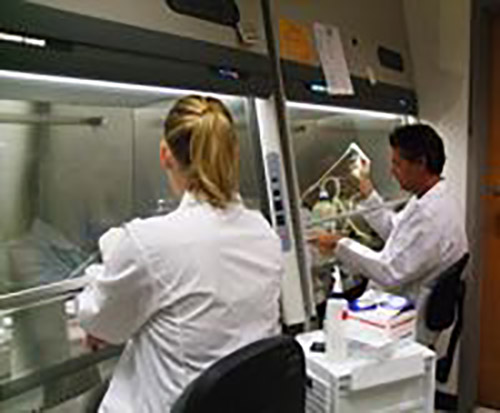
The Tulane University Hematology and Medical Oncology Fellowship program is dedicated to training individuals to be competent, humanistic, and scholarly physicians. Fellows are expected to provide comprehensive care to adults patients presenting with Hematological and Oncologic disease in both the impatient and ambulatory settings. Specific goals are listed below.
Fellows are expected to read extensively, to use texts only as a base of information and to seek out primary source material in the literature to develop skills in critical analysis of data. The aim is to prepare fellows for a lifetime of continuing scholarship.
- Fellows must be able to provide a goal centered consultation; in addition to the clinical evaluation of the patient fellows must be able to thoroughly review pertinent history and lab data
- Fellows must understand basic coagulation pathophysiology and be able to discuss appropriate laboratory evaluation and differential diagnosis of coagulation disorders
- Fellows must advance their understanding of the management of platelet and coagulation disorders through critical reading of the literature
- Practice Bone Marrow biopsies.
- Enroll patients in clinical studies.
- Learn how to write chemotherapy orders accurately
- Fellows must be able to access the medical literature to answer clinical questions
- Fellows must be able to apply knowledge gained when presented with new situations
- Fellows should demonstrate independence in formulating patient care plan.
- Evaluate peripheral smears and Bone Marrow biopsies.
- Learn about Flow Cytometry and it applications in the diagnosis of Hematologic Malignancies.
- Learn about transfusion Medicine, indications for transfusion and handling of different types of products
- Learn about Acute Leukemia, Hodgkin's and Non-Hodgkin's Lymphomas, Aplastic Anemias, MDS and other Hematologic Malignancies.
- Learn staging of different types of malignancies , and the standard treatment guidelines for each stage
- Locates, appraises and utilizes scientific evidence to their patient's health problems and the larger population from which they are drawn.
- Applies knowledge of study designs and statistical methods to the appraisal of clinical studies and other information on diagnostic and therapeutic effectiveness.
- Utilizes information technology to manage information, access online medical information, and support their education for patient care.
- Provide supervision of students, junior fellows and residents involved in the management of Hematology/Oncology patients.
- Analyze their practice experience and perform practice-based improvement activities using a systematic methodology.
- Fellows must appreciate the cost of health care and must be cost conscious in making clinical decisions.
- Arrives on time and is prepared for work.
- Dresses appropriately and with cleanliness.
- Willingly sees patients throughout the entire shift.
- Participates in appropriate sign-outs (both giving and receiving)
- Practices patient advocacy in disposition.
- Completes medical records honestly and punctually.
- Treats patients, family, and other personnel with respect.
- Protects staff, family, and patient interests and confidentiality.
- Demonstrates sensitivity to patient's pain, emotional state, and gender/ethnicity issues.
- Seeks feedback and immediately self-corrects.
- Introduces himself/herself to the patient and family.
- Coordinates a teamwork strategy.
- Accepts responsibility and is accountable.
- Demonstrates open and responsive attitude to feedback from other team members, patients, families and peers.
- Discusses end of life honestly, sensitively, patiently and compassionately.
- Demonstrates the ability to respectfully, effectively and efficiently develop a therapeutic relationship with patients and their families.
- Works well with faculty, nursing and emergency department staff.
- Views the experience from the patient's perspective and learns to identify patient expectations.
- Demonstrates respect for diversity and cultural, ethnic, spiritual, emotional, and age-specific differences in patients and other members of the health care team.
- Demonstrate effective listening skills and be able to elicit and provide information using verbal, nonverbal, written and technological skills.
- Demonstrates ability to effectively use the feedback provided by others.
- Learn the skill of counseling patients about terminal illness and end of life care.
- Demonstrate the ability to negotiate as well as resolve conflicts.
- Demonstrate effective participation in and leadership of the healthcare team.
- Understands accesses, utilizes, and evaluates effectiveness of resource providers, and systems to provide optimal care.
- Understands different medical practice models and delivery systems and how to best utilize them to care for the individual patient.
- Practices quality, cost-effective health care.
- Advocates and facilitates patient advancement through the health care system.
The Section of Hematology and Medical Oncology based didactic methods include Grand Rounds Conference, Morbidity and Mortality Conference, BMT/Leukemia Conference, Tumor Board, Journal Club and Study Guide Conference.
The attending physician providing direct supervision for the resident will provide a written evaluation on www.MedHub.com. Fellows will be evaluated on the six core competencies and will be given numerical scores..
Written evaluations will be kept on www.MedHub.com. Fellows are able to view their evaluations anytime they desire. Fellows are encouraged to view their rotation evaluations as soon as possible. More frequent evaluation and feedback will be done as needed on an individual basis. Fellows will evaluate the rotation and the staff at the end of each rotation by using the MedHub system.
